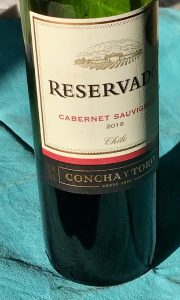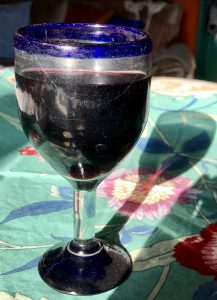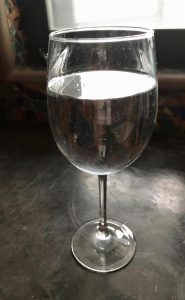I used to look forward to five o’clock, wherever I was living in the world, because that was the time I allowed myself a glass or two of wine. It was always red wine, the only alcoholic drink I drank, preferably Cabernet Sauvignon from Chile — dependable and affordable — good enough for me.
This was my daily treat to myself, akin to milk-and-cookies after school when I was a kid, a reward for the day’s labors. As the vino tinto slowly seeped through my body with each sip, I could feel knots in my stomach unknot and the built-up tensions of that day ease. I thought of this wine as pleasant medication, good in every way. It even helped to lower my cholesterol, I bragged to friends.
I was already well into my twenties before I’d had my first alcoholic drink. Up to that point I feared alcohol. I was afraid I might become like my father. Was the tendency toward alcoholism genetic, I wondered? Was it true that the Scots and the Irish are more prone to alcoholism than other ethnicities? (My father was a full-blooded Scot.) Did he pass that gene, along with a love of books and reading, onto me? I didn’t want to tempt fate. I vowed I would never let that happen to me.
So, after I began to drink, tentatively and socially, in my twenties, I was always strict with myself: no more than two drinks on any given day; very seldom more, sometimes less or none. I would have only wine, and only red wine. I was in control. I’d grown up watching a man who was often out of control, and I didn’t want to be like him.
He had had such promise when he was young: tall, handsome, dashing, articulate, educated, athletic, he was like a character out of an F. Scott Fitzgerald novel. I once discovered in my mother’s bedroom dresser drawer a faded photo of him when he was in his twenties. In this photo he’s wearing a smart, light-colored summer suit and a fedora tipped to one side, and he’s leaning jauntily against a stone wall. According to my mother, he was a ladies’ man then, a real charmer. She was one of many ladies he charmed.
I wasn’t. I knew him later, after the alcohol had taken over and he was someone else, after all his youthful promise had vanished. Curiously, none of us his four children, though we came of age in the ‘60s, ever found the alcohol or drug use among our cohorts appealing; we’d seen too closely for far too long what substance abuse could do.
We chose not to follow our father’s example. Our ‘60s rebellion was to go in the opposite direction. None of us used drugs or became alcoholics.
Now I find I must write about my pleasant, daily five o’clock wine ritual in the past tense. Alcohol in every form, I learned last fall when I was diagnosed with ulcerative colitis, is, for me, on the long, long “Forbidden” list. I haven’t had a glass of wine since early October 2020. And I must say I miss it.
But this is the time of life, I’m finding, to try, with as much grace as possible, to let go of a lot of things. Red wine in the evening for me is one of those things.
So now, sometimes at five o’clock, I’ll fill a tall wine glass with cool, clean water, sip it slowly, and pretend.



